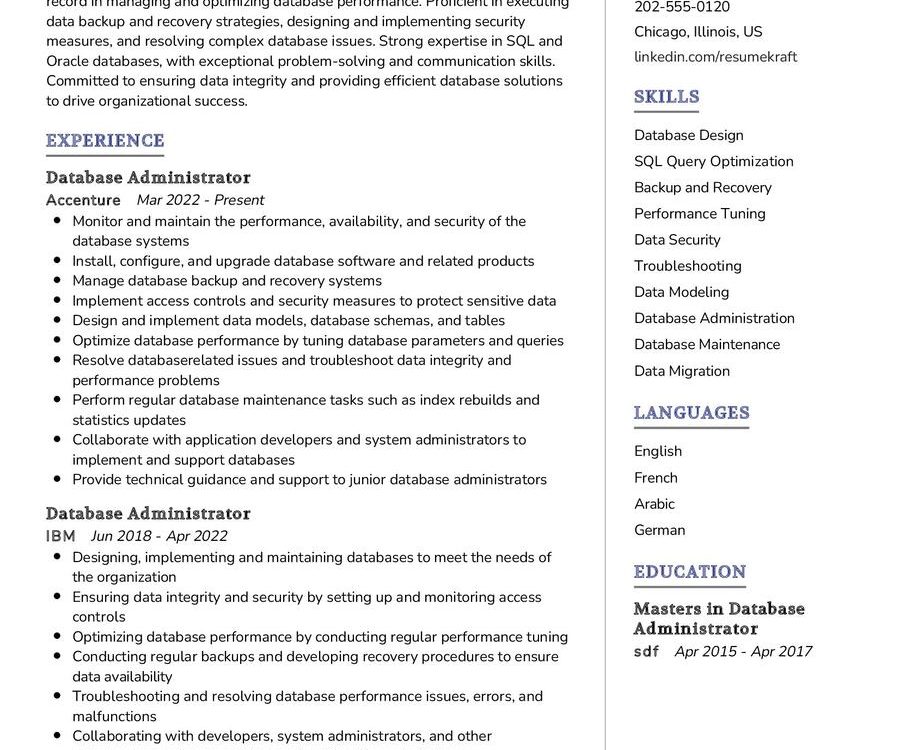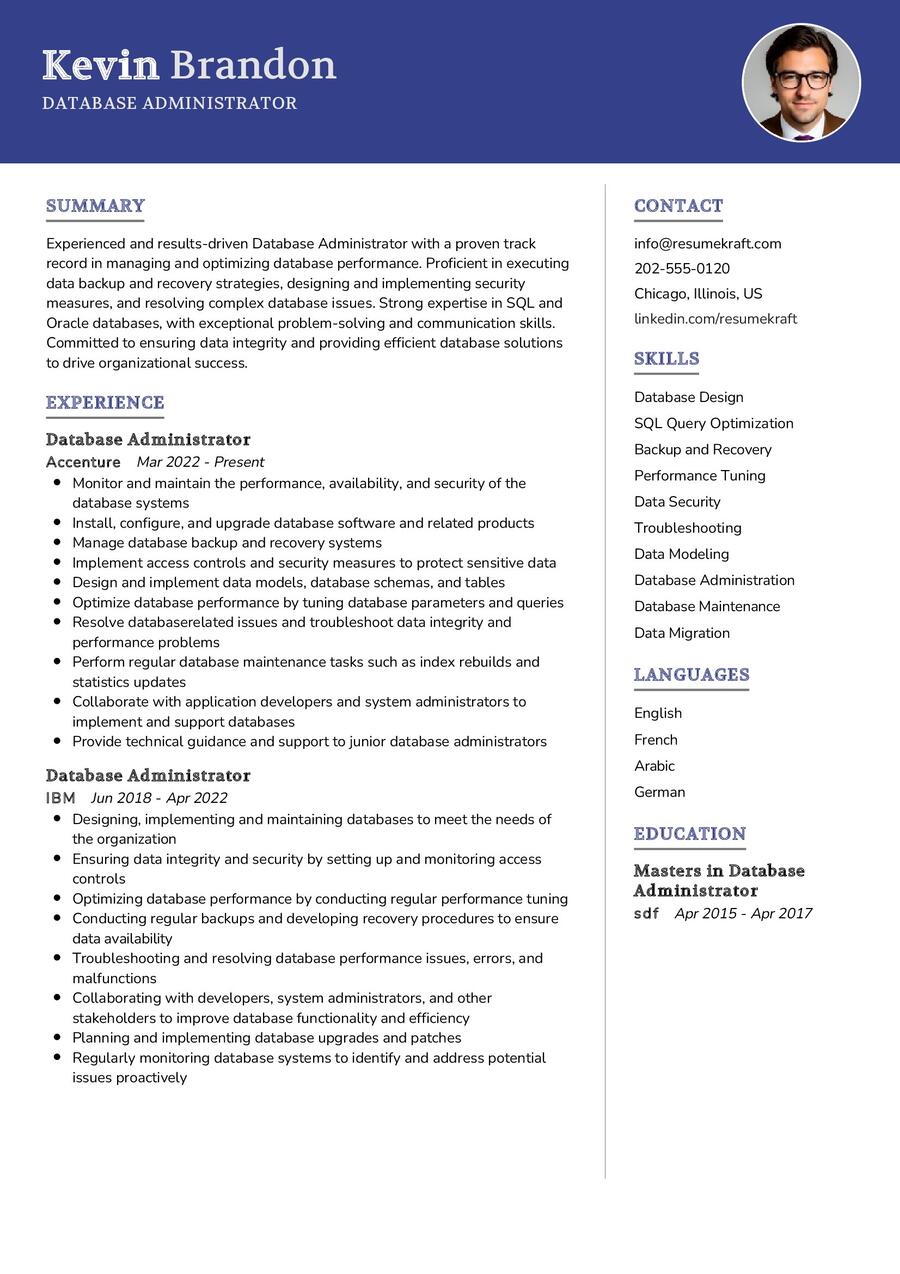Unlocking Success as a Database Administrator
In the dynamic realm of technology, the role of a Database Administrator (DBA) has emerged as a linchpin in ensuring the seamless management of data. A harmonious blend of technical prowess and organizational finesse, the DBA role is crucial for businesses relying on efficient data handling. Let’s delve into the multifaceted responsibilities, essential skills, and key strategies for crafting an exemplary Database Administrator resume.
Understanding the Database Administrator Role
A Database Administrator plays a pivotal role in the effective management, organization, and security of an organization’s data infrastructure. This involves overseeing the installation, configuration, and maintenance of database management systems, ensuring data integrity, and optimizing performance. The DBA serves as a guardian of information, implementing security measures and backup strategies to safeguard against data loss or unauthorized access.
Moreover, the DBA collaborates with cross-functional teams to understand data requirements, streamline processes, and troubleshoot any database-related issues. They are instrumental in the implementation of data-driven solutions, making data accessible and usable for decision-making throughout the organization.
Essential Database Administrator Job Requirements
Becoming a Database Administrator requires a blend of education, technical expertise, and problem-solving skills. Here are the key prerequisites for aspiring DBAs:
- A Bachelor’s or Master’s degree in Computer Science, Information Technology, or a related field, showcasing a strong foundation in the technical domain.
- Proficient knowledge of database management systems such as Oracle, MySQL, or Microsoft SQL Server.
- Hands-on experience in database design, implementation, and maintenance, demonstrating a trajectory of increasing responsibility.
- Excellent problem-solving and analytical skills, honed through experiences and possibly through courses and certifications.
- Strong communication skills, enabling effective collaboration with colleagues and stakeholders.
- Adaptability to evolving technologies and industry best practices, crucial for staying ahead in the ever-changing IT landscape.
Additional certifications in database administration can enhance your profile and distinguish you in the competitive job market.
Key Responsibilities of a Database Administrator
The role of a Database Administrator is multifaceted, encompassing various responsibilities critical for maintaining a robust and efficient database environment. Let’s explore the core duties that define the DBA role:
- Managing and optimizing database performance, ensuring efficient data retrieval and processing.
- Implementing data security measures, including access controls and encryption, to safeguard sensitive information.
- Planning and executing database backup and recovery strategies to prevent data loss in case of system failures.
- Collaborating with development teams to design and implement database structures that meet application requirements.
- Monitoring database systems for anomalies, identifying and resolving issues promptly to minimize downtime.
- Conducting regular database health checks, applying patches, and implementing upgrades to maintain system reliability.
- Providing technical support and guidance to end-users, ensuring they can effectively interact with the database.
Each responsibility presents an opportunity for learning and growth, shaping you into an indispensable asset in the field of database administration.
Crafting a Stellar Database Administrator Resume
Your resume is your professional story, showcasing your journey, skills, and value as a Database Administrator. Here are some tips to create a resume that stands out:
- Highlight your experience with specific database management systems, detailing your contributions and achievements.
- Showcase instances where your problem-solving skills have led to improved database performance or enhanced security measures.
- Quantify your achievements with metrics, providing tangible evidence of your impact on database efficiency.
- List relevant certifications, emphasizing your commitment to staying updated with industry standards.
- Personalize your resume for each application, aligning your skills and experiences with the specific job requirements.
Your resume is a canvas where you paint your career story, and each brushstroke should reflect your expertise and accomplishments as a Database Administrator.
Database Administrator Resume Summary Examples
Your resume summary is the gateway to your professional narrative. Craft a powerful snapshot of your skills and experiences with examples like:
- “Dedicated Database Administrator with over 8 years of experience optimizing SQL Server databases, achieving a 30% improvement in query performance.”
- “Results-driven DBA specializing in Oracle database management, successfully implementing backup strategies that reduced data recovery time by 40%.”
- “Experienced MySQL Database Administrator, recognized for implementing security measures that enhanced data protection and compliance with industry standards.”
Your summary should entice the reader to explore the rich details of your career within the subsequent sections of your resume.
Experience Section for Your Database Administrator Resume
Your experience section is the core of your resume, narrating the story of your career milestones and contributions. Provide detailed examples such as:
- “Led a team in migrating a complex database structure to PostgreSQL, resulting in a 25% reduction in data retrieval time.”
- “Implemented a data encryption protocol, ensuring compliance with industry regulations and enhancing data security for a financial client.”
- “Streamlined database backup procedures, reducing recovery time from system failures and minimizing data loss risks.”
Your experiences are the chapters that make up your professional book, illustrating your expertise in managing databases effectively.
Education Section for Your Database Administrator Resume
Your educational journey is the foundation of your expertise. Showcase your academic achievements with examples like:
- Master of Science in Computer Science, XYZ University, 2015.
- Bachelor of Technology in Information Technology, ABC College, 2012.
- Oracle Certified Professional (OCP), Database Administrator, 2017.
Each educational qualification is a stepping stone, contributing to your proficiency in database administration.
Database Administrator Skills for Your Resume
Your skill set is your toolbox, reflecting the diverse range of tools you have mastered. Highlight your abilities in both soft and hard skills:
Soft Skills:
- Problem-solving and analytical skills, vital for identifying and resolving database issues.
- Effective communication, facilitating collaboration with teams and stakeholders.
- Attention to detail, ensuring data accuracy and system reliability.
- Adaptability to changing technologies, staying ahead in the dynamic field of database administration.
Hard Skills:
- Proficiency in Oracle, MySQL, or Microsoft SQL Server, depending on your specialization.
- Database design and implementation, showcasing your hands-on experience.
- Data security measures, including access controls and encryption techniques.
- Backup and recovery strategies, crucial for minimizing data loss risks.
- Monitoring and optimization of database performance, ensuring efficient data processing.
Each skill is a tool, empowering you to manage databases effectively and contribute to the success of your organization.
Avoiding Common Mistakes in a Database Administrator Resume
As you craft your resume, steer clear of common pitfalls that can hinder your chances of landing your dream job. Avoid mistakes such as:
- Using generic language; tailor your resume to highlight your unique fit for the Database Administrator role.
- Focusing solely on job duties; emphasize your achievements and the impact you’ve had on database efficiency.
- Underestimating the importance of a cover letter; use it as an opportunity to further showcase your skills and experiences.
- Overloading your resume with technical jargon; ensure that your true value is easily understood by non-technical readers.
- Failing to proofread; a polished resume reflects positively on your attention to detail and professionalism.
Avoid these mistakes to craft a resume that authentically showcases your expertise as a Database Administrator.
Key Takeaways for Your Database Administrator Resume
As we conclude this comprehensive guide, remember these key points while creating your Database Administrator resume:
- Emphasize your expertise with specific database management systems and highlight achievements in optimizing performance and enhancing security.
- Quantify your impact with metrics, providing tangible evidence of your contributions to database efficiency.
- Personalize your resume for each application, aligning your skills with the specific requirements of the job.
- Include a section on continuous learning, showcasing relevant certifications and your commitment to staying updated with industry standards.
Finally, feel free to utilize resources like AI Resume Builder, Resume Design, Resume Samples, Resume Examples, Resume Skills, Resume Help, Resume Synonyms, and Job Responsibilities to create a standout application and prepare for the Database Administrator job interview.
Armed with these insights and tips, you are now ready to craft a resume that is a true reflection of your journey, your skills, and your aspirations. Best of luck!


